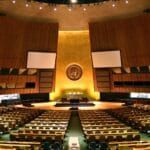Nuclear materials security: Cooperation is key
By Fissile Materials Working Group | June 28, 2011
As South Korea prepares for the second Nuclear Security Summit, scheduled to take place in Seoul next March, the momentum for collective international action on nuclear terrorism must be sustained. In the months before the 2012 talks, states will have to work together to retain focus on the summit’s ultimate goal — securing vulnerable nuclear material worldwide — or else risk taking a step backward in the fight against the menace of nuclear terrorism.
Protect the gains made so far. The April 2010 Nuclear Security Summit in Washington, DC, created a tremendous opportunity to reshape global perspectives on nuclear terrorism. For the first time, the idea of fighting nuclear terrorism emerged on the collective international agenda, rather than on the discrete agendas of individual nations. Before the 2010 summit, the topic of nuclear terrorism had been confined, politically, to national governments and, intellectually, to a few Western think tanks, university departments, and nongovernmental organizations. In organizations outside the West, nuclear terrorism was even considered a marginal or remote issue — despite the growing threat of terrorist networks with international reach, such as the Taliban or Al Qaeda.
The 2010 summit in Washington seemed to change that attitude. Among other steps taken at the meeting, four states — India, China, Japan, and Italy — announced plans to establish nuclear security centers to promote global nuclear security; today, each state has begun to operate these centers. In India, for example, the objective of the new School of Nuclear Security Studies at the Global Centre for Nuclear Energy Partnership is to introduce security forces from around the world to physical-protection systems and response procedures using advanced technologies, such as sensors and seismic monitoring; the school offers courses on physical security, personnel reliability, materials control, and accounting. India also signed a memorandum of understanding with Japan and the United States agreeing to share best practices for the security of nuclear material and facilities; These countries will each work to develop nuclear security training curricula and programs for the global nuclear industry, nuclear scientists, and the security forces protecting nuclear facilities.
Signs of trouble? Despite the many positive developments made as a result of the April 2010 summit, states’ dedication to collaborative international action on nuclear security is anything but certain. In fact, within months of the summit, the apparent trend toward collective action seemed to be in danger. When representatives from the 47 states that participated in the first Nuclear Security Summit gathered in Buenos Aires in November 2010 to review the national commitments made in April, the meeting seemed to lose sight of the overarching goal, devolving into disagreements. The spirit of consensus-building that had prevailed in April gave way to confrontation, and the meeting of nuclear security “sherpas” (diplomats who represent their governments at conferences) was unsuccessful. Partly responsible for this were the long-standing differences in interests between the Non-Aligned Movement and Western states; this fracture, which commonly emerges at international negotiations, led to the creation of factions that pushed their own agendas at the Buenos Aires meeting.
For example, one of the contentious proposals, championed by Australia and other countries, was the establishment of a monitoring system — based on the work plan and communiqué agreed to at the Washington summit — that would evaluate the progress states have made in implementing their agreed-upon commitments. Several states opposed the idea, while Jordan proposed a different set of monitoring criteria altogether.
Stay focused on international collaboration. The proposed monitoring system, though in line with the Washington summit’s main principle of states agreeing to national implementation of nuclear security mechanisms on a voluntary basis, appeared to some nations to challenge their sovereignty. In Buenos Aires, many representatives asked where national jurisdiction would end and international jurisdiction would begin. For some states, this brought to light a serious concern that could undermine the success of future summits if it remains unaddressed: that the Nuclear Security Summit was making an unwelcome transition toward law enforcement.
Furthermore, some of the proposals made at the Buenos Aires meeting of sherpas seemed to marginalize the importance of the International Atomic Energy Agency (IAEA) and its role in global nuclear security. In fact, the centrality of the IAEA to future joint efforts to strengthen nuclear security had been agreed on, even before the April 2010 summit. Hopefully, in the future, IAEA’s centrality will remain undisturbed.
At least two more sherpa meetings are planned to take place before the 2012 Seoul summit. These meetings must harness the goodwill generated by the Washington summit and soothe the concerns that emerged in Buenos Aires. The sherpa meetings (and the Seoul summit itself) need to work to clarify the international collaborative element and to reinforce the goal of securing vulnerable nuclear materials. The meetings should focus on nuclear security in the wake of Fukushima. The synergy of safety and security must be included in the 2012 agenda.
Now that the fight against nuclear terrorism has gained a spot on the collective international agenda, we must work to keep it there. We cannot afford to allow divisive issues to dilute the main principles of the summit process. A repetition of the failed Buenos Aires meeting would slow the passage of an effective nuclear security and counterterrorism regime that the world badly needs. The Seoul Nuclear Security Summit will provide the chance for countries to band together to fight nuclear terrorism. In the final analysis, this is an opportunity that cannot be squandered.
Editor’s Note: This column was written by Rajiv Nayan, international partner of the Fissile Materials Working Group and a senior research associate at the Institute for Defence Studies and Analyses in New Delhi.
Together, we make the world safer.
The Bulletin elevates expert voices above the noise. But as an independent nonprofit organization, our operations depend on the support of readers like you. Help us continue to deliver quality journalism that holds leaders accountable. Your support of our work at any level is important. In return, we promise our coverage will be understandable, influential, vigilant, solution-oriented, and fair-minded. Together we can make a difference.
Topics: Columnists, Nuclear Weapons















